|
|
|
Sort Order |
|
|
|
Items / Page
|
|
|
|
|
|
|
| Srl | Item |
| 1 |
ID:
168261
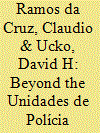

|
|
|
|
|
| Summary/Abstract |
Ten years ago, in 2008, the Brazilian Government adopted a strategy to regain control over the favelas in Rio de Janeiro – the Pacifying Police Units (UPP). In spite of initial favorable results, the main threat, namely the Red Command (CV), fought back and by 2014 the UPP strategy was badly frayed. In order to defeat this threat, it is necessary to reconceptualize CV as a criminal insurgency and to pinpoint and address the social and political factors that sustain it. This allows for a response inspired by the ‘shape-clear-hold-build’ counterinsurgency approach, which while cost-intensive is, in the long term, the most sustainable path to achieving security within the favelas and integrating these neglected areas within the broader city of Rio de Janeiro.
|
|
|
|
|
|
|
|
|
|
|
|
|
|
|
|
| 2 |
ID:
168267
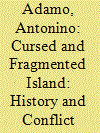

|
|
|
|
|
| Summary/Abstract |
This paper is a review piece examining the main factors responsible for the civil war, lasting from 1988 to 1998, on Bougainville island, an autonomous region in Papua New Guinea. History, economy, and social aspects of the island – especially traditional society features, mining activities, the effects of colonization and industrialization – are highlighted. The aim of the article is to identify which factors best explain the outbreak of the conflict. The main assumption is that no single factor can explain the civil war, as these elements require a comprehensive analysis. The ‘resource curse’ theory, i.e. the presence of natural resources leading to economic failure, and the existence of ethnic cleavages, are proposed as explanations, although further factors must also taken into account. Finally, the analysis helps to contextualize the unfolding events in Bougainville and its path to democratization.
|
|
|
|
|
|
|
|
|
|
|
|
|
|
|
|
| 3 |
ID:
168262
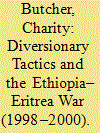

|
|
|
|
|
| Summary/Abstract |
Diversionary theories of war suggest that leaders may engage in bellicose foreign policies to divert the public’s attention from domestic problems and capitalize on a ‘rally around the flag’ type of effect. The evidence regarding diversionary theory is quite mixed. More recently, scholars have focused on situations that create opportunities for diversionary behavior, such as international rivalry and territorial disputes. This paper adds to the growing literature on diversionary conflict by considering the Ethiopia–Eritrea case and applying an opportunity-based approach. We assess whether the Ethiopia–Eritrea War (1998–2000) is consistent with diversionary explanations for the war, as many have previously claimed.
|
|
|
|
|
|
|
|
|
|
|
|
|
|
|
|
| 4 |
ID:
168264
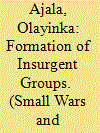

|
|
|
|
|
| Summary/Abstract |
Contrary to earlier notions that religious diversity, ethnicity and the lack of economic development are the main factors responsible for the surge of violence in Nigeria, this article argues that the means of attaining or retaining political authority by politicians are responsible for violent conflicts and the formation of insurgent groups. Using theories of patrimonialism and prebendalism, the article argues that political power and authority are often channelled for personal use in a predatory manner that results in the formation of insurgent groups. The aim of this article is to proffer a different analytical framework for the understanding of the formation of insurgent groups based on political authority.
|
|
|
|
|
|
|
|
|
|
|
|
|
|
|
|
| 5 |
ID:
168266
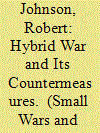

|
|
|
|
|
| Summary/Abstract |
This article examines critically the literature of hybrid war and evaluates the countermeasures often proposed. It explains the concept of hybrid warfare and its varied interpretations, illustrating how it is a manifestation of current anxieties in armed conflict. The selection of the literature is based on works that are referenced, that offer a scientific approach, and which review either the phenomenon of hybrid warfare or its countermeasures empirically. Unscientific works have been omitted. The analysis of the literature presented here shows that the antidotes to ‘hybridity’ lie not in the operational or tactical sphere but in strategic and political domains.
|
|
|
|
|
|
|
|
|
|
|
|
|
|
|
|
| 6 |
ID:
168260
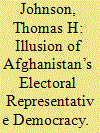

|
|
|
|
|
| Summary/Abstract |
This article is the latest in a series of published articles systematically examining Afghan Presidential and legislative elections. Structural problems including fraud, ethno-linguistic block voting, and the Single Non-Transferable Vote have had significant impacts on the development of Afghan democratic elections. The challenge now facing the current Afghan government and future elections is the daunting task of uniting the Afghan people while not repeating the electoral mistakes of the past. The tricky balancing act of fostering an overarching national identity without being perceived as privileging particular identities requires strong leadership and a willingness to challenge traditional ethnic, linguistic, and religious norms when need be. Karzai and Ghani Administrations have seriously failed relative to this dynamic.
|
|
|
|
|
|
|
|
|
|
|
|
|
|
|
|
| 7 |
ID:
168265


|
|
|
| 8 |
ID:
168263
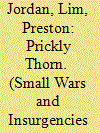

|
|
|
|
|
| Summary/Abstract |
Orde Wingate’s Special Night Squads played a key role in defeating the Great Arab Revolt of 1936–1939. Wingate’s Night Squads were distinctive in their approach to counter-insurgency warfare; in addition to bringing Arab insurgents to battle, the Night Squads proved their mettle by ‘flying the flag’ and by improving cooperation between Jewish settlers and British servicemen. Nevertheless, the Night Squad’s accomplishments and legacy must be properly situated within the broader wave of tactical innovations undertaken by the British Army throughout the Rebellion.
|
|
|
|
|
|
|
|
|
|
|
|
|
|
|
|
|
|
|
|
|